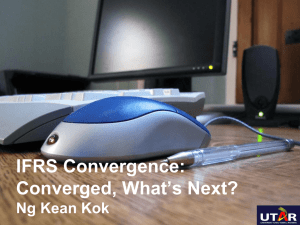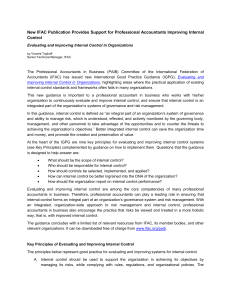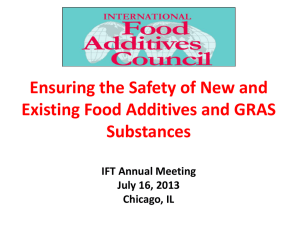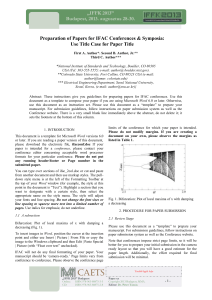Membership Application Process
advertisement
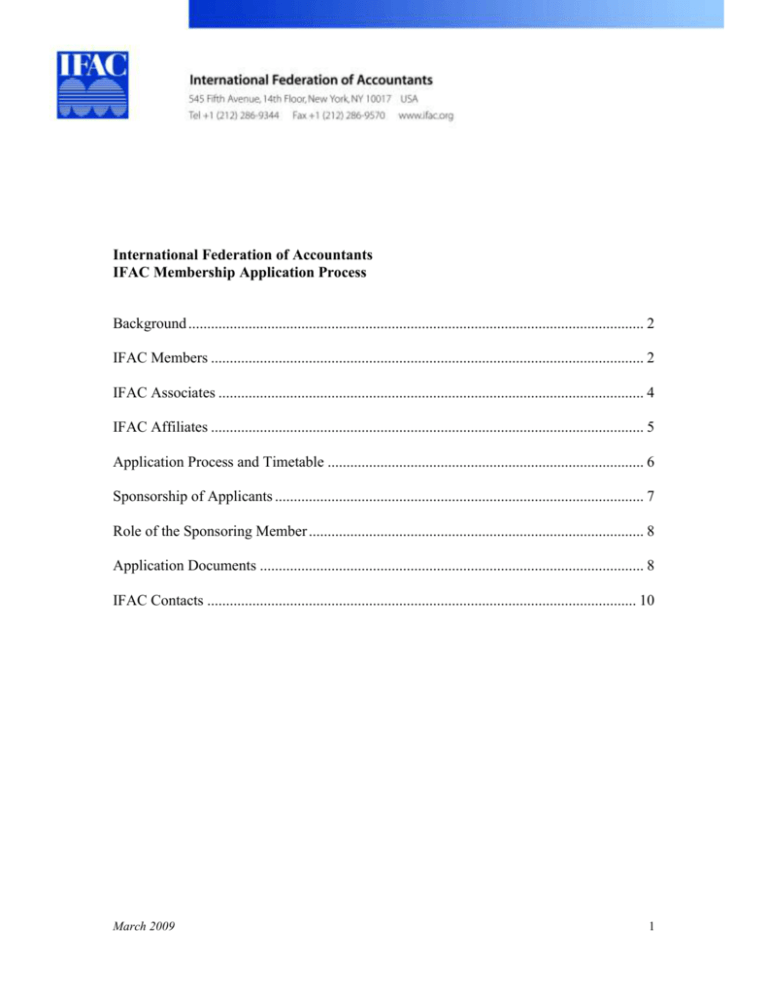
International Federation of Accountants IFAC Membership Application Process Background ......................................................................................................................... 2 IFAC Members ................................................................................................................... 2 IFAC Associates ................................................................................................................. 4 IFAC Affiliates ................................................................................................................... 5 Application Process and Timetable .................................................................................... 6 Sponsorship of Applicants .................................................................................................. 7 Role of the Sponsoring Member ......................................................................................... 8 Application Documents ...................................................................................................... 8 IFAC Contacts .................................................................................................................. 10 March 2009 1 Background IFAC Mission The mission of the International Federation of Accountants (IFAC) is to serve the public interest, strengthen the accountancy profession worldwide and contribute to the development of strong international economies by establishing and promoting adherence to high quality professional standards, furthering the international convergence of such standards and speaking out on public interest issues where the profession’s expertise is most relevant. Responsibility for Membership Applications The IFAC Board has the authority and responsibility for determining the criteria for and procedures by which organizations will be admitted into membership of IFAC. The purpose of the Compliance Advisory Panel (CAP) is to oversee the implementation and operation of the IFAC Compliance program which is the responsibility of the IFAC Staff reporting to the Chief Executive. This paper outlines the categories for application to IFAC (member, associate and affiliate), the criteria to be met by applicants, the role and obligations of the Sponsoring IFAC member, and the documents to be completed by applicants. IFAC Members Criteria for Membership1 Membership shall be open to Professional Accountancy Organizations2 meeting the following criteria: 1 2 The organization is acknowledged, either by legal decree or by general consensus, as being a national professional organization in good standing in the jurisdiction. In the case of general consensus, evidence exists that it does have the support of the public and other key stakeholders. The organization has met the obligations specified in the IFAC Statements of Membership Obligations (SMOs). In those cases where an organization has not yet met all the obligations in the SMOs, the organization has prepared a realistic and detailed action plan to meet such obligations. The organization actively participates in the IFAC Member Body Compliance Program. The organization is committed to participate in IFAC and promote the importance IFAC By-Laws – November 2008. See Appendix 1. March 2009 2 of IFAC and the International Accounting Standards Board (hereinafter referred to as the “IASB”) programs, activities and pronouncements. The organization is financially and operationally viable, and has an appropriate governance structure. The organization has an internal operating structure that provides for the support and regulation of its members. Statements of Membership Obligations The SMOs clarify IFAC’s membership obligations with respect to IFAC’s objectives. The SMOs address International Standards (Standards issued by IFAC and the International Accounting Standards Board (IASB)) and requirements for quality assurance and investigation and discipline of professional accountants and are as follows: SMO 1 Quality Assurance SMO 2 International Education Standards for Professional Accountants and Other IAESB Guidance SMO 3 International Standards Related Practice Statements and Other Papers issued by the International Auditing and Assurance Standards Board SMO 4 IFAC Code of Ethics for Professional Accountants SMO 5 International Public Sector Accounting Standards and other IPSASB Guidance SMO 6 Investigation and Discipline SMO 7 International Financial Reporting Standards. The SMOs require members to use their best endeavors to meet these obligations and to actively promote international accountancy programs and standards established by IFAC and the IASB. This requirement involves a significant commitment on the part of members. Members will be expected, through the Member Body Compliance Program, to periodically demonstrate the efforts that have been made to fulfill their commitment and achieve their obligations. Membership Entitlements3 Member bodies in good standing are entitled to attend and vote at Council meetings (unless they are considered to be a delinquent member body), to seek nomination to the IFAC Board and other boards, committees or advisory panels, receive access to publications, and to participate in other activities as deemed appropriate by the Board or Council. Membership Dues Members are assessed dues based on economic and membership size indicators. Dues are 3 See footnote 1. March 2009 3 calculated and invoiced annually on January 1. Please refer to the IFAC Member Body Reference Manual. IFAC Associates Criteria for IFAC Associate4 Associate status shall be open to Professional Accountancy Organizations that do not yet meet all the admission criteria stated above, but demonstrate commitment to meeting such criteria and progressing to membership. Other Considerations Some Professional Accountancy Organizations are at an earlier stage of development or operate within a regulatory and standard-setting framework that present challenges with respect to demonstrating compliance with the SMOs. Once admitted as an associate, IFAC will monitor the associate’s progress in implementing agreed actions and generally, where progress has been made, the associate will be encouraged to apply for membership within two to three years. Associates are also required to participate in the Member Body Compliance Program. Associate Entitlements5 Associates are entitled to attend and to participate in the discussions and deliberations at meetings of the Council, receive access to publications, and to participate in other activities as deemed appropriate by the Board or Council. Associates are not entitled to vote at meetings of the Council. Associate Dues Associates are assessed dues based on the minimum level established for IFAC members. Dues are calculated and invoiced annually on January 1. The dues methodology also includes minimum and maximum dues considerations. Please refer to the IFAC Member Body Reference Manual for information about the dues calculation. 4 5 See footnote 1. See footnote 1. March 2009 4 IFAC Affiliates Criteria for IFAC Affiliates6 Affiliate status shall be open to organizations that do not meet the associate admission criteria but that have as an objective the development of the accountancy profession. In considering applications for Affiliate status, IFAC will seek evidence to demonstrate that the organization: Is of good standing and enjoys appropriate visibility; Has a financial and organizational structure that supports its viability; Has an interest in IFAC and IASB and their programs, activities and pronouncements; and Will promote IFAC and IASB’s activities. Other Considerations Affiliates may have international, regional or national membership and normally represent a group of professionals who interface frequently with the accountancy profession. Affiliate Entitlements7 Affiliates are permitted to attend, but not vote at, Council meetings and to participate, by invitation only, in IFAC activities. Such invitations will normally be made where the affiliates has specific expertise to contribute to the IFAC activity (e.g., committee or task force). Affiliate Dues Affiliates dues are invoiced annually on January 1. Please refer to the IFAC Member Body Reference Manual. 6 7 See footnote 1. See footnote 1. March 2009 5 Application Process and Timetable Application Deadline Complete application materials, including the required application fee (see below) need to be received by IFAC by May 31. This is necessary to allow sufficient time for the Compliance Staff and the CAP to review such materials and form a recommendation to the Board by its September meeting. Complete applications submitted after May 31 will be considered for the next year’s approval process. When incomplete applications are submitted and additional information requested by IFAC is not provided by applicant body prior to the May 31 deadline, the application file may be closed at the discretion of the Staff, with the approval of the CAP Chair. Application Fee Requirement Applicants must submit an application fee as part of the process.8 The fee is effective for applications submitted for the 2010 approval process (that is applications to be approved by the Council in November 2010). The application fee is calculated as follows: The application fee for first time applicants for associate or member status would be equal to their first year’s dues up to a maximum fee of $25,000.9 As noted above, members and associates are assessed dues based on economic and membership size indicators. Consequently, the calculation of an applicant’s application fee will vary from applicant to applicant and should be confirmed with the Compliance staff as part of the membership application process. The application fee is non-refundable and must be paid by the May 31 deadline. If the application does not lead to a positive recommendation to the IFAC Board in that year, the applicant would only need to pay an application fee that is 50% of the fee as calculated under the first bullet when it applies the second time. The reduction reflects the fact that some due diligence was already conducted during the first application submission. Associates applying for full membership would be required to pay an application fee that is equal to 50% of the fee as calculated under the first bullet. Application Fee Transitional Provisions Any applications received by May 31, 2009 will not be subject to a fee. In addition, any unsuccessful applicants from 2008 and 2009 and who reapply in 2010 would not be subject to the fee. By “application received”, the Compliance staff means a complete set of application materials received by the May 31 8 9 The IFAC Board approved the requirement for an application fee at its November 2008 meeting. Dues for Associates are $2,000 (2009) and $3,000 (2010). March 2009 6 deadline. Support of Existing IFAC Member The application process requires applicants to obtain an Attestation of Support from an existing IFAC member which must submit information that will provide IFAC with sufficient knowledge to evaluate the applicant’s membership request. Application Review Process Once the complete application is received at the IFAC offices, it will be reviewed by the Member Body Compliance Staff to ensure all necessary information is included. The Staff will contact the applicant during the process to seek clarification of information where necessary. Staff will also contact the sponsoring member and possibly others to seek confirmation of information. Once all required information has been received and any questions have been sufficiently answered, an initial recommendation for membership may be made. The Staff will refer the application to the CAP for its review and consultation. The Staff may then make a recommendation to the IFAC Board. The Board will then consider the application and, if approved, makes a recommendation to the Council that the application should be approved. The Council then votes whether to approve the Board’s recommendation. If approval is not recommended at any stage of the process, the applicant will be advised as soon as it is practicable. The Board currently meets four times a year, usually in February, June, September and November. An application may be considered by the Board at the February, June and September meetings. The application is presented to the Council for final approval at its next annual meeting, normally in November. The entire process, from Staff review, CAP review and Board consideration may take between six months to one year depending on the completeness of information provided by the applicant and the need for further consultation with the applicant or others. Thus, applications should be submitted with sufficient lead time and all the required information. Sponsorship of Applicants In using their discretion in recommending to the Board the admission of a professional accountancy body to membership, the IFAC Compliance Staff and CAP are guided by the following principles: The applicant shall be nominated by an IFAC member ; If the country is already represented by one or more members, the applicant shall seek nomination by at least one of these members; If the member(s) represented in IFAC in the country of the applicant body will not nominate the applicant body, IFAC will seek to understand the reasons for the lack of such nomination. Where the reasons provided for the lack of nomination March 2009 7 from the IFAC member(s) in that country are justified on public interest grounds, IFAC will not approve the application. In other cases, IFAC will consider a nomination from another IFAC member from outside the country. Role of the Sponsoring Member The support provided to the Applicant by the sponsoring member throughout the application process contributes significantly towards the work of the IFAC Compliance Staff and CAP in evaluating the applicant body. For this reason, the Sponsoring Member is required to provide: An Attestation of Support; and A Report about their knowledge of certain aspects of the applicant organization, the application and supporting documentation, Compliance Program questionnaires, and audited financial statements for the most recent two years. Throughout the application process, the IFAC Compliance Staff obtains as much factual information about the applicant as possible. Sources will generally include the applicant body, sponsoring body, internal research, and external stakeholders. Nevertheless, it relies heavily on the sponsorship of the existing IFAC member. The act of sponsorship is not, therefore, a mere formality. It is an affirmation by the sponsoring body to IFAC and its fellow members that: The Sponsoring Member has sufficient knowledge of the applicant body to provide reasonable grounds for supporting the application; and The Sponsoring Member has reviewed the application form and supporting documentation and that such information is correct and complete to the best of their knowledge. The Sponsoring Member has a responsibility to IFAC and its fellow members to present an objective assessment. If this is not possible, it should decline to sponsor the applicant, as it is under no obligation to do so. Additionally, if there are factors related to the application (favorable or unfavorable) that are not evident in the application, these should be communicated to IFAC. The IFAC Compliance Staff and CAP wish to be in possession of all information relevant to the application for membership before making its recommendation to the IFAC Board and Council. An attestation of support by an existing member is required for each category of membership including affiliate applicants. It is up to the applicant to secure the support. This support is evidenced by the completion of the Attestation of Support form. Application Documents The application process seeks to obtain general information about the applicant’s operations and financial position, the regulatory and standard-setting framework that the applicant operates within, its role and responsibilities with respect to the profession nationally, and its stage of compliance with international standards. The following March 2009 8 documents must be completed and submitted to be considered for membership10: Sponsoring IFAC Member Attestation of Support and Report by IFAC member. The original attestation and the supporting member’s overview about the applicant should be received when the application is submitted. In all circumstances, the IFAC Staff will contact the IFAC member body providing the Attestation of Support to obtain a full understanding of the procedures performed with regards to the applicant. Applicant Applicant’s Assessment of the Regulatory and Standard Setting Framework. For detailed instructions on completing the Assessment of the Regulatory and Standard-Setting Framework questionnaire, please refer to the questionnaire. SMO Self-Assessment. The applicant’s self-assessment with respect to the matters addressed by the Statements of Membership Obligations. Applicant General Information and Declaration of Intent. This document requests supplemental information about the applicant to assist IFAC in understanding the governance structure, infrastructure and activities of the applicant. Applicants are also required to affirm their intentions regarding IFAC membership by completing the Declaration of Intent. Audited Financial Statements. The applicant body should provide the Sponsoring Body and IFAC with its most recent two years of audited financial statements, preferably prepared in accordance IFRS and audited in accordance with ISAs. Application Fee. The applicant’s payment of the application fee. Membership Statistics Form. This document requests information about the applicant’s membership size and the sectors they operate / work in, the categories of membership and sources of the applicant’s revenues. The information should be provided for the last three years. To make the application procedure as efficient as possible, we request that the applicant adhere to the following guidelines in completing the application. 10 All documents and requested information are required to process an application form. Application documents must be completed in their entirety in English. As much information as possible should be provided in response to specific questions. While there are no guidelines as to what is sufficient and this will differ from organization to organization depending on the specific circumstances of the applicant, the information must be sufficiently descriptive for an external party to obtain a full appreciation about the role and responsibilities of the applicant, its operating structure, and the regulatory and standard-setting framework in its country. Additional information such as that suggested in the General Information All forms are available on IFAC’s website at www.ifac.org or by contacting IFAC Compliance Staff. Applicants will require a login codes to complete the Assessment of the Regulatory and StandardSetting Framework questionnaire and the SMO Self-Assessment questionnaire. These codes can be obtained by contacting IFAC Compliance Staff. March 2009 9 form may be submitted in the local language accompanied by a brief description as to the information content. The completed form in a Word (.doc) file should be emailed to IFAC. A copy should also be mailed to IFAC. The Assessment of the Regulatory and Standard-Setting Framework questionnaire and the SMO Self-Assessment questionnaire should be completed electronically on the internet (refer to the IFAC Compliance Program website www.ifac.org/ComplianceProgram for more information about these questionnaires). IFAC Contacts All information should be submitted (preferably in electronic format) to: Ms. Daria Koukhar Technical Manager IFAC Member Body Development 545 Fifth Avenue 14th Floor New York, NY USA 10025 Email: DariaKoukhar@ifac.org Tel: +1-212-286-9684 Fax: +1-212-286-9570 Inquiries may also be directed to Sylvia Barrett: Ms. Sylvia Barrett Deputy Director IFAC Member Body Development 545 Fifth Avenue 14th Floor New York, NY USA 10025 Email: SylviaBarrett@ifac.org Tel: +1 212-286-9563 March 2009 Fax: +1-212-286-9570 10 Appendix 1 In assessing whether an organization is a professional accountancy organization, the Compliance Staff and the CAP shall refer to certain guiding definitions. These definitions have been prepared to assist in the IFAC membership process and are not intended to be used or cited as authoritative definitions. Professional Accountancy Organization An organization, with a core focus of Accountancy, which meets the key attributes of a Profession such that its members who hold a certification, license or authorization to practice are subject to: Education, including examination of professional competence, practical experience requirements and continuing education Ethics Enforcement Each member body determines the specific criteria for its members, in accordance with any applicable legislation or regulation. Members of professional accountancy organizations may operate at different levels of competencies and professional profiles. Accountancy is the profession of accounting. Accounting comprises measurement, preparation, validation, disclosure, auditing of and provision of assurance and advisory services on financial information.1 Profession Short definition: A profession is a group of people in a learned occupation, the members of which agree to abide by specified rules of conduct when practicing the profession.2 Full definition: A profession is a group of individuals who adhere to ethical standards and uphold themselves as possessing special knowledge and skills in a widely recognised body of learning derived from research, education and training at a high level, and who exercise this knowledge and these skills in the interest of others. It is inherent in the definition of a profession that a code of ethics governs the activities of each professional. Such codes require behaviour and practice beyond the personal legal and moral obligations of an individual. They define and demand high standards of behaviour in respect to the services provided to the public and in dealing with professional colleagues. Further, these codes are enforced by the profession and are acknowledged and accepted by the community.3 1 Adapted from a definition obtained from Wikipedia. Analytic Quality Glossary Quality Research International. 3 Adapted from definition developed by the Australian Council of Professions (2004). 2 January 2009 11
